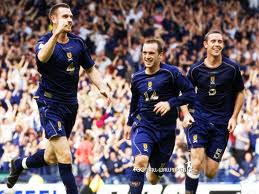
Thursday, April 5, 2012
Manchester United Football Grounds

Wednesday, April 4, 2012
Scottish Cup Final Football
Scotland has the second oldest national Football Association in the world (behind England's FA), and the trophy for the national cup, the Scottish Cup, is the oldest sporting trophy in the world. Scottish football club Rangers have won a world record 54 league titles. Scotland and Scottish football clubs hold many records for football attendances; A game known as "football" was played in Scotland as early as the 15th century: it was prohibited by the Football Act 1424 and although the law fell into disuse it was not repealed until 1906. There is evidence for schoolboys playing a "football" ball game in Aberdeen in 1633 (some references cite 1636) which is notable as an early allusion to what some have considered to be passing the ball.

Th"repercute pilam" (strike the ball again) in the original Latin. It is not certain that the ball was being struck between members of the same team. The original word translated as "goal" is "metum", literally meaning the "pillar at each end of the circus course" in a Roman chariot race. There is a reference to "get hold of the ball before [another player] does" (Praeripe illi pilam is posses agere) suggesting that handling of the ball was allowed. One sentence states in the original 1930 translation "Throw you against him" (Age, objice te illi). The Scottish Football Association (SFA) is the principal organising body for Scottish football. Members of the SFA include clubs in Scotland, affiliated national associations as well as local associations. It was formed in 1873, making it the World's second oldest national football association.
The SFA is responsible for the operation of the Scotland National Football Team, the annual Scottish Cup and several other duties important to the functioning of the game in Scotland. The Scottish Football Association Challenge Cup commonly known as the Scottish Cup or the William Hill Scottish Cup for sponsorship purposes is the main national cup competition in Scottish football. It is a knockout cup competition run by and named after the Scottish Football Association. Scottish Cup Final Tickets are available at Ticket4Football.com for affordable precede word "pass" in the most recent translation is derived from "huc percute" (strike it here) and later
